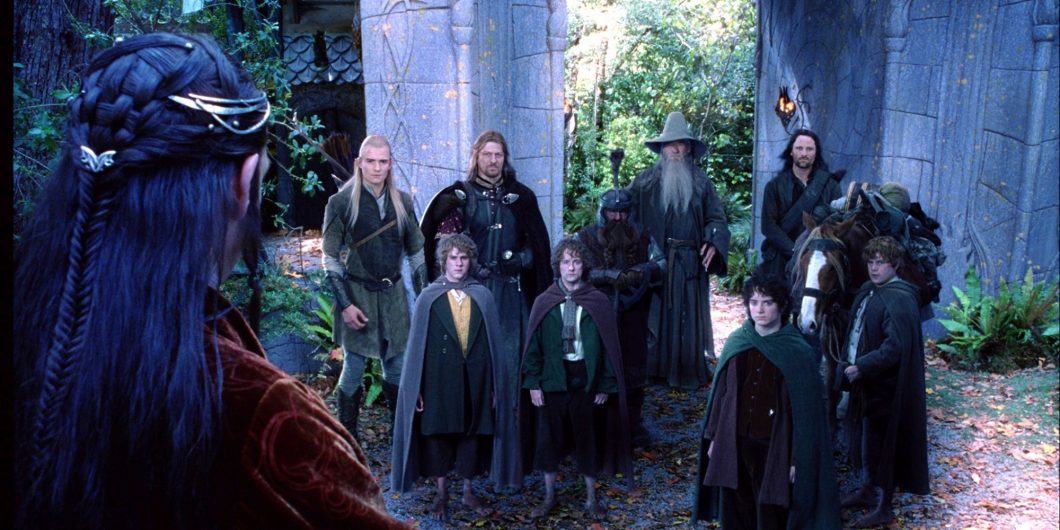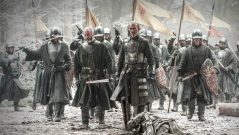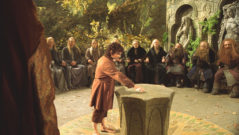Defenders of Civilization
The 20th anniversary of Peter Jackson’s Lord of the Rings films is cause for celebration, particularly for conservatives. For they are perhaps the only great box office and Oscar successes that conservatives can claim as their own in the last generation. After all, is there any author other than Tolkien who could be academically erudite, religiously faithful, and beloved of children all at once? He would seem to have written himself as the wizard Gandalf, the friend of hobbits—ordinary people—everywhere.
The Lord of the Rings was the best kind of middlebrow art, since it was connected directly to faith, a linkage we need now that the faithful are mostly shut out of popular culture. The story is also connected to historical learning—to a vision of the political transformations of European history, of which America is a rightful inheritor. It not only got the young to watch something, but it inspired and edified them. It might have even gotten some of them to read the books, which are of course better than the movies.
Here at long last was dignity for the desperate parent—who too often says to himself, “let my child read anything, but just let him read!” Instead, parents everywhere could please their children by giving in to something popular in the full expectation that it would lead to something meritorious, even virtuous. Admittedly, it seems unreasonable to expect every child to become very wise and valorous, but this franchise promised much to parents—a truce, or even peace between Americans riven by increasingly mad culture wars.
A War to End All Wars
The movies were timed expertly from the point of view of his audience. 2001 was the beginning of a transformation now completed: the takeover of entertainment by children’s fantasies. Marvel and Star Wars and other things Disney produces are firmly in control of the American imagination, but they are unfortunately silly; in 2001, we hoped that fantasy might elevate entertainment to art through a combination of new digital technology for cinema (particularly special effects) and a return to the medieval past, the time of legends.
But thematically, the movies were completely unwelcome at the time, since these are stories about societies collapsing in face of barbarism or barely surviving terrifying invasions, experiences and even thoughts alien to most Americans. We had no idea that in a decade or so, they’d come around to hating each other socially, politically, and culturally—and with a passion not seen since the Civil War. Tolkien’s mournful heroism, his thematic treatment of weak and broken men fighting for faith and civilization against desperate odds, was incomprehensible to audiences and critics alike. Jackson bought great public success at the price of all moral seriousness. There has been no public opinion defending this story as a call to defend and renew civilization, not even on the conservative side, however beloved these movies are privately.
His movies, however, speak eloquently now, when talk of civil war or American collapse is constant, although they are broken up into memes for the benefit of a new generation of digital Americans. The ring of Sauron is now an obvious metaphor for out of control state power; the eye of Sauron stands in for surveillance technology that fulfills the fantasies of totalitarian tyrants; the various characters the hobbits meet in their adventure give clear examples of the temptations and corruption of men who have good intentions but not enough intelligence or faith to make it through the hour of testing. The story now can be understood as a version of Pilgrim’s Progress.
Jackson speaks more clearly to our times than any other artist in the fantasy business because he has learned two important things from Tolkien, which at least at first glance are very conservative. First is that war is a serious matter. Jackson structured the movies to give battle the full powers available to cinema, showing how it makes or breaks men and countries. In a matter of a few hours, everything can be decided on which depend the lives and hopes of generations or even ages. It is the greatest thing mankind can be involved in, partly because we cannot escape it. The war to destroy the one ring is decisive in a spiritual sense; it does not promise perpetual peace, but protection from the unique evil of a tyranny that corrupts souls even easier than it can crush bodies. Even more than Tolkien, Jackson teaches that it’s better to die a free man than live a slave and so he does his best to show us how free men yearning for peace nonetheless prepare for war.
The full exertion of the different powers of many people and, indeed, entire peoples is necessary for defense. The possibility of such an alliance is a sign, desperately sought, of the common good we defend from a spiritual tyranny we can call diabolic, since it wishes first and above all to deceive. This is rare enough in our storytelling, but the idea is rarer still of a unique danger arising from the weakness of our souls, which will be tested once and for good. It’s not a series of episodes that goes on forever, it’s do or die.
A King to Withstand the Enemy
Tolkien seems to have wanted to defend artistically the very idea of defense. War is revealed to be the test of man’s greatness and therefore in a sense the maker of it. His heroes are almost always ready to kill, though not eager. They are wedded to mercy, since Tolkien was as Christian as America is, but they are neither soft nor careless. This leads to the second thing Jackson learned—the necessity of some kind of kingship. If war is constitutive to human affairs, law is simply not enough for our purposes. Law is general and cannot deal with extraordinary circumstances; law speaks but does not do the deeds it requires; law might itself be in need of defense by a kind of man who will take it upon himself to fulfill the law especially when it is in danger, a man of supreme ability in whom shines the belief that our common good is his highest imperative.
Jackson’s movies insist far more than Tolkien did on showing something like equality between the various heroes. Ours is a democratic age and everything is bent in that direction.
While victory is crucial against a tyranny we now call totalitarian, it is very uncertain whether we can achieve it, or if we even deserve the civilized life for which we fight. When we perceive our own weakness, we come to fear that we deserve the worst. We can easily turn to blaming each other; we become bitter or even hateful when we learn that we cannot have what we took for granted, a life without terrifying demands, the certainty that all future generations will thrive in peace. Worse still, in seeing our own pettiness, we might come to believe our enemies are right to want to destroy us.
We therefore need someone who can withstand the enemy, and it goes without saying that a certain political wisdom is required of such a king, something most of us simply do not and cannot have. We may do something good within the limits of our powers, and there is dignity in that activity. But we still need someone to mind all our business together when we are each busy minding our business apart from one another. To be free means in some sense to depend on someone else’s wisdom.
America is divided on these matters; we are not a warlike people, because we do not see anything we would want to conquer. It’s uniquely and distinctly American to have created an empire in World War II and then given up the conquered land the moment we could have peace. But we are, truth be told, free only because we are violent, bellicose, querulous—constantly fighting among ourselves and with others, ready to take up arms. We were not too troubled by Jackson’s message of a war to save civilization and faith; but we are born democrats, we revere a republican government that divides powers, and we can prove mighty unwilling to follow a leader, however wise. So we simply ignored what Jackson was showing us when it became uncomfortable, because at the time we thought we had the luxury to do so. His very popular movies were about the collapse of civilization, a theme of no interest at the time; but now, many millions feel its power and we could all use the opportunity to connect fear about the future to such an elaborate story of political decadence and rejuvenation.
We have various messianic political rulers, but our technological oligarchs tend to be, too. For all the pretentions of politicians and bureaucrats, none has ever had enough power to decide what lives we should live. We have never united in obeying any one of them, not for long and not regarding essential matters, given our distrust of kingship. If Jackson is right, however, this will not be enough and we can indeed see a growing weakness among ourselves, a growing fear and submissiveness in a people once proud. We might be sacrificing our freedom; we might be turning cowardly. Increasingly, we feel the uncertainty of the future—we guess at a threat we cannot grasp well enough to do anything about it.
Democracy
These two problems—war and kingship—should guide you when you watch these movies again. This one question alone will give life to Jackson’s trilogy: How can Americans unite politically to act in defense of civilization and faith? Or if we do not raise this question, we will have reduced it to a half-forgotten childhood memory: dear to us, but not worth a second thought.
Jackson’s movies insist far more than Tolkien did on showing something like equality between the various heroes. Ours is a democratic age and everything is bent in that direction. We find it much easier to trust ideological abstractions than to trust men, who after all, are no better than ourselves and altogether too small to measure up to events, technology, or fate. He wants us to fight against this envy with admiration and against its underlying despair by trying to compete with each other the way these heroes do. Like them, we might become better together not by mere tolerance, but by striving to prove ourselves and help each other.
A similar phenomenon is revealed by the strangest change Jackson made to the story, making everyone look and act young, though much of the cast of heroes is supposed to have the experience of the ages giving them power or burdening them. Almost everyone young is good, not to say great, and there’s no thought given to tradition. Meanwhile, the old age of the decadent rulers is emphasized, as though the very world that needs saving is too worn out, when in fact the contending rulers are made almost coeval by tradition. That’s a silly prejudice we have, the extreme of democracy; after all, old and young are unequal at least with respect to experience. But I think Jackson meant this as a sign of hope, that it is possible spiritually to renew ourselves that we may act with the vigor of youth. Certainly, he intended his story to make up what youth lacks, experience, and to make everyone more serious, and perhaps somewhat wiser—wise enough at least, to look for wise leaders.
I will write next about Tolkien’s own attempt to teach political wisdom and thus conclude a series I’ve written on medieval fantasy (The Green Knight and the Sir Gawain poem) and the use of the medieval in science fiction (the original Foundation series and the new AppleTV+ adaptation, as well as the Dune novels and their movie adaptations). These are competing visions of humanity offered to us as resources for educating ourselves and therefore educating the young; they are emerging now because we feel the crisis upon us and want to know its character. It’s time to learn that wisdom is as needful as rare.



